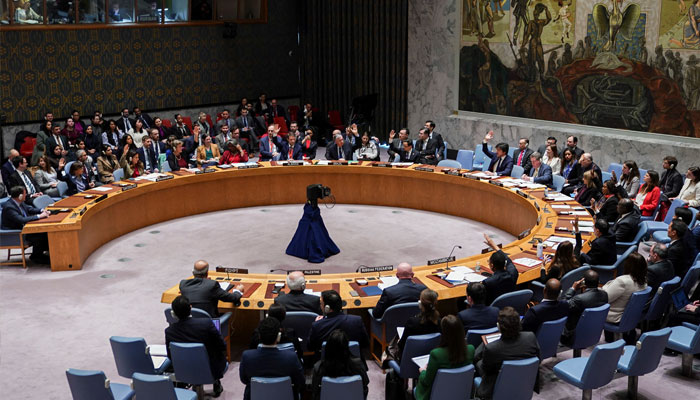Media watchdogs warn UN cybercrime treaty could muzzle the press
Proposed by Russia in 2017, treaty is nearing completion after several years of negotiations
KARACHI: Global media watchdogs and rights groups have expressed their reservations regarding the UN’s Comprehensive International Convention on Cybercrime that is in the process of being finalised. Organisations like the International Press Institute, Committee to Protect Journalists (CPJ), Washington Post Press Freedom Partners and others have openly called the proposed treaty a danger for journalists.
In a post on X (Twitter), IPI has urged the US to “reject a dangerous new global treaty that will give authorities sweeping surveillance powers and hand authoritarians even more tools to target and muzzle the press.” Washington Post Press Freedom Partners also tweeted about the dangers posed by the proposed convention, saying that it could “hand governments around the world dangerous new spying capabilities to track down and punish journalists, and give repressive regimes even more tools for targeting and muzzling the press.”
Initially proposed by Russia in 2017, the now-controversial treaty is nearing completion after several years of contentious negotiations. Despite strong opposition from the US, European countries, and digital rights groups, the UN General Assembly formed a committee in 2019 to draft the treaty. On Monday, UN member states opened a two-week meeting to finalise the treaty. Critics, including Human Rights Watch, argue that the treaty’s broad scope could lead to increased surveillance and repression, targeting journalists, activists, and marginalised groups under the guise of combating cybercrime.
The Freedom Online Coalition, a group of 40 nations including the US, has emphasised the treaty’s potential misuse for domestic and transnational repression and called for more narrowly defined terms and robust safeguards. Tech giants like Microsoft and a coalition of over 100 technology companies have also voiced opposition, warning that the treaty could compromise cybersecurity, facilitate government overreach, and criminalize legitimate cybersecurity research.
The Global Network Initiative (GNI), a global multistakeholder organization focused on freedom of expression and privacy in the technology sector, has also expressed deep concerns about the latest draft of the proposed convention. The GNI has urged member states to reconsider its necessity, given existing frameworks like the Budapest Convention, and said that the proposed draft poses significant risks to privacy, freedom of expression, assembly etc and has provisions that could criminalise legitimate online activities, enable excessive state surveillance, and lack necessary human rights safeguards.
According to critics, the treaty could allow pervasive cross-border surveillance without adequate safeguards. However, Russia has defended the draft, arguing that excessive focus on human rights would hinder international cooperation. For now, the treaty’s outcome remains uncertain.
-
 Benny Blanco Addresses ‘dirty Feet’ Backlash After Podcast Moment Sparks Online Frenzy
Benny Blanco Addresses ‘dirty Feet’ Backlash After Podcast Moment Sparks Online Frenzy -
 Sarah Ferguson Unusual Trait That Confused Royal Expert
Sarah Ferguson Unusual Trait That Confused Royal Expert -
 Prince William, Kate Middleton Left Sarah Ferguson Feeling 'worthless'
Prince William, Kate Middleton Left Sarah Ferguson Feeling 'worthless' -
 Ben Affleck Focused On 'real Prize,' Stability After Jennifer Garner Speaks About Co Parenting Mechanics
Ben Affleck Focused On 'real Prize,' Stability After Jennifer Garner Speaks About Co Parenting Mechanics -
 Luke Grimes Reveals Hilarious Reason His Baby Can't Stop Laughing At Him
Luke Grimes Reveals Hilarious Reason His Baby Can't Stop Laughing At Him -
 Why Kate Middleton, Prince William Opt For ‘show Stopping Style’
Why Kate Middleton, Prince William Opt For ‘show Stopping Style’ -
 Here's Why Leonardo DiCaprio Will Not Attend This Year's 'Actors Award' Despite Major Nomination
Here's Why Leonardo DiCaprio Will Not Attend This Year's 'Actors Award' Despite Major Nomination -
 Ethan Hawke Reflects On Hollywood Success As Fifth Oscar Nomination Arrives
Ethan Hawke Reflects On Hollywood Success As Fifth Oscar Nomination Arrives -
 Tom Cruise Feeling Down In The Dumps Post A Series Of Failed Romances: Report
Tom Cruise Feeling Down In The Dumps Post A Series Of Failed Romances: Report -
 'The Pitt' Producer Reveals Why He Was Nervous For The New Ep Of Season Two
'The Pitt' Producer Reveals Why He Was Nervous For The New Ep Of Season Two -
 Maggie Gyllenhaal Gets Honest About Being Jealous Of Jake Gyllenhaal
Maggie Gyllenhaal Gets Honest About Being Jealous Of Jake Gyllenhaal -
 'Bridgerton' Star Luke Thompson Gets Honest About Season Five
'Bridgerton' Star Luke Thompson Gets Honest About Season Five -
 Prince William On Verge Of Breakdown Because Of 'disgraced' Andrew
Prince William On Verge Of Breakdown Because Of 'disgraced' Andrew -
 Tig Notaro Reflects On Oscar Nod For 'Come See Me In The Good Light': 'I Was Sleeping'
Tig Notaro Reflects On Oscar Nod For 'Come See Me In The Good Light': 'I Was Sleeping' -
 Kenyon Sadiq Sets 40-yard Dash Record At NFL Scouting Combine, Eyes First Round
Kenyon Sadiq Sets 40-yard Dash Record At NFL Scouting Combine, Eyes First Round -
 Talk Show Host Drops Hint About Taylor Swift, Travis Kelce Wedding Date
Talk Show Host Drops Hint About Taylor Swift, Travis Kelce Wedding Date




